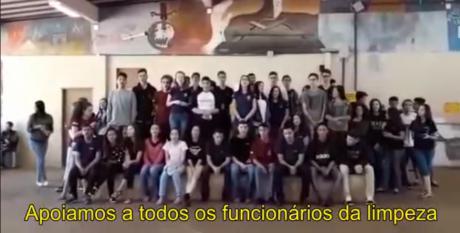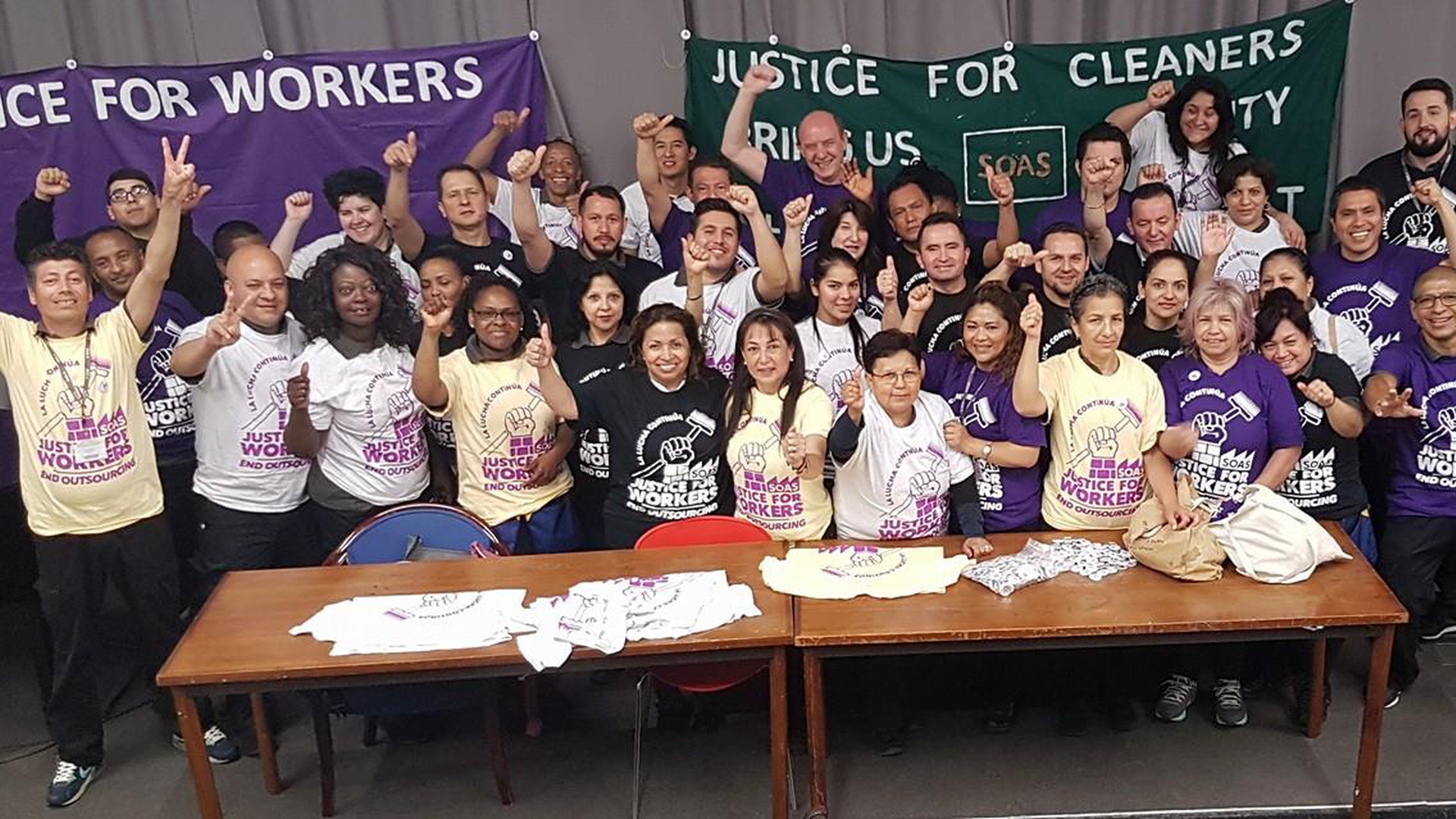Invisible Nodes

inquiry
Invisible Nodes
by
Invisíveis
/
Dec. 15, 2018
A solidarity network of university workers in Brazil
The documents below were translated by a university worker in Goias, Brazil. They are part of a network called Invisíveis (or Invisibles) that is meant to create solidarity practices between workers regardless of their level of education and status as direct, outsourced, and temporary workers. The manifesto below has been translated in an attempt to get in touch with other workers interested in struggles to unify precarious workers of all levels. In addition, there are also editorials from their Invisíveis newspaper. All the original documents can be found in Portuguese on their website.
Invisíveis Manifesto
Hello, dear reader.
This site was produced by ordinary workers who believe in the importance of organizing in way of autonomous, solidary and day-to-day. The maintenance of independent means of communication in non-profit platforms are an important piece of this process.
Our collective was born in the middle of 2017 with the idea of some workers that we needed to focus our political action in the main place of our lives: our workplaces; and in the most present people in our lives: our workmates, either stable or precarious, outsourced or direct employees. Starting by our own lives to kick-start a deeper change in our society – a change in which workers have more voice and power, since there isn’t a single thing that works in this world without our input – we started with a printed bulletin and a Facebook page.
This site is part of our effort to make public our “private” problems in this life of exploitation. It is still under construction, and needs to be improved – also like our efforts of organization and struggle in the current historical moment. We count on you for improvements, dear reader, with suggestions and comments. We also hope that such an initiative stimulates other similar efforts and we expect solidarity of other groups and platforms with common interests. We did not make this site to substitute or compete with anyone, but to make a constructive contribution. We also made this site to make available a history of the work we’ve done to workers who may have lived similar situations or may have interest in that subject. We also have made available the archive of our “regular” and “special” bulletins.
Below are our documents explaining who we are and what we propose to workers and our perspective of building a solidarity network between workers.
Who are we?
Being a worker is really hard - when you’re alone! The situation is similar in our neighborhoods. How many times do we depend on the help of our neighbor to take care of kids, being driven to the hospital, when food is lacking or when we need company? How many times do we depend on our coworkers to get through problems in our work time? Solidarity is what allows us to survive in this world of exploitation. O Invisiveis was created to amplify and deepen our solidarity so we can survive and go beyond.
Many of us change jobs or places frequently – and every place has similar problems. At the company, our wages often come late, the boss or our coworkers oppress us, many times we feel isolated and disrespected. Problems at work continue in our ‘rest’ time – the lousy public transport, the landlord who wants to raise our rent or evict us, a family member who has been waiting for months for a surgery or exam in the public health services. They try to convince you that the problem is just yours to dealt with. But we are hundreds, thousands, millions who are in the lines of social services, public transportation, in precarious neighborhoods. We work in companies, apps, “public” services, in the streets of the city and may even be unemployed. The problem is ours to deal with. If that is true, what can we do? Who can do it?
We are small workers of public and private companies. We have a Facebook page, a site and printed bulletins to publicize our problems and strengthen our struggles. None of is a lawyer, specialist or friends of TV network reporters. But we know our rights. We know how to organize. And we know that without our effort, the effort of the working class, nothing in this world can be put to use. We want to discuss your problem with you, fellow worker, and help you organize with your co-workers to find a solution. We want you to know that you are not alone.
Form an invisible node
A path we suggest to those who want to organize with us to defend themselves and improve their lives is to create a Node in our Solidarity Network.
An Invisible Node is a small group of workers in the company or workplace that makes sure the workers in that place have access to the information of other workers, and informs the workers of other places in the network about what’s going on in their own places. The node consists of the people who take responsibility for encouraging and making the culture of solidarity stronger in the workplace.
These people can meet informally or organize a meeting every once in a while – we suggest once every one or two weeks. According to the level of surveillance from the bosses, it may be interesting to use the moments of rest or lunchtime and talk more informally. These people have the role of, for example:
- Stimulating workers to share space and time together – sharing coffee, lunch places, taking time out of your work to say hi and chat a little with your coworkers and persuade others to do the same. People who don’t live and talk together don’t know each other’s problems and have no way of practicing solidarity.
- Staying alert to situations of harassment that we and our coworkers may be suffering. Talking to a coworker after he is reprimanded publicly by the bosses is a simple but important step to helping that coworker and starts the groundwork for possible collective changes. In time and with proper organization, it may be a good idea to gather a group of coworkers and talk to the boss to make him change this kind of procedure.
- Encouraging a culture where all workers of that place are valued, respected, paid properly and acknowledged. If any of them isn’t, investigate why and try to make that change together with the coworker.
- Helping the workers communicate directly and solve their problems without needing the bosses or supervisors. Help inhibit the culture of competition, ratting out and gossiping.
These are some of the basic steps to begin organizing in your own workplace. With a little effort and time available – and also the help of your coworkers in not ratting you out to the bosses – it’s possible to do some more. Below are two extra steps that may help break the separation of workers and help of other groups of workers from different workplaces, be it by making use of material (pamphlets, texts, audios/videos) of a reality that is similar to your workplace, or by asking for help to publish your own texts or produce your own bulletin with the help of other workers. You can do that by making contact and being part of the Invisiveis network, or you can try to find and create other groups more compatible with your reality. Regardless, the Invísiveis network will always be open to help (even to those who do not identity as Invisíveis) and welcome you in your network, because we believe that together we are stronger!
-
Find a way to make our “regular” bulletin reach workers who are interested in the subject in your workplace. Find a way to send the produced audios and videos so people can have access to them. Help feed the Facebook page and the site, and produce bulletins with recent happenings of your company or workplace.
-
Keep on eye in the problems, the conflicts, the cases of invisible solidarity between workers. Try to produce or seek reports of these happenings and send them to the other nodes of the network to encourage a culture of analyzing our workplace and communicating with other workers. Pay special attention to delays in wages, unfair sackings and payment cuts.
You don’t have to do it alone! From your observation and conversations may come ideas for texts, videos, actions and other things. The network exists precisely to make it possible for us to do what we couldn’t alone – and for us to begin searching for practical ways of enacting change by our own action, now that we are no longer alone.
Invisíveis – a newspaper from who? To whom?
Editorial of the First Bulletin 2017 - September, 2018.
This small bulletin was created so we could express our voice. The voice of those who are only remembered when things don’t work. When the floor is dirty, when the system is blocked, when no one can find their book in the library. Without us no one puts the air conditioner or the projector to work. But with us, we are invisible. Students and teachers pass right through us, as if we didn’t exist. But we have names. We have dignity. We practice and now we demand solidarity.
We want this bulletin to work for you, “invisible” worker, meio worker,1 express yourself. We don’t care if you are directly contracted, temporary, outsourced, intern. Which company or institution you’re employed by. We want you to speak, to organize, to join us. Let us show the value of our work. And build resistance against ALL the bosses and ALL managers.
This bulletin has no connection to political parties, unions or bosses. It is financed by donations from regular workers like you and me. Our objective is to build a solidarity network between us and allow our struggles to reach new heights.
Editorial of the Second Bulletin, “Locais de Trabalho” - February, 2018
The first edition of Invisiveis published a report of an outsourced cleaning worker stationed at the Caraibas Class Center in UFG, in which she tells of the segregation imposed against the cleaning personnel, that she was forbidden from using the building to have her meals and keep away her belongings.
Two months after the report and thanks to the collective and solidary struggle of the workers, the situation is reversed and today they have their rights secured to feed and rest decently, and keeping her belongings in a safe locale. Not just them: all of the workers of all the Class Centers.
This fact reveals that only the true resistance of the workers is capable of stopping the advances of exploitation and oppression promoted by capital and State. We cannot wait for the bureaucratic action of the unions. We must organize on the ground, on the factory floor, in the Class Centers, in Faculties, in Call Centers etc and demand respect and our rights.
In that sense, the Caraibas Class Center case is exemplar, because it provoked conflict between the bosses who, after the case was divulged, did not see eye to eye and finally solved the dilemma in favour of the workers.
The Invisiveis collective reinforces our commitment to work to build a solidarity network among all workers – whether direct employee, outsourcee, intern – with the objective to win over the true place of those who produce social wealth: EQUALITY!
Editorial of the second bulletin, “Neighbourhood Invisíveis” - February, 2018
Neighborhood Invisíveis. Who are we? We are saleswoman and men, construction workers, workers of various professions. Regular people who got together to fight for their interests. We do not have connection to a political party, we do not get involved in elections, we don’t want to owe or do anyone any favors. We want to fight together for our rights. We want to be listened in our neighborhood, in our city. There’s no point in waiting for saviors, for the mayor, for the construction companies. We will only be seen when we struggle. If you agree, join us. Write to our bulletin, do your report, organize with your neighbors and coworkers.
Editorial of the third bulletin
“#EuApoioOs23” - August 2018
The theme of this edition is solidarity: acknowledgement of the work and importance of our coworkers, no matter if direct or outsourced. Concern for our coworker who is not getting paid regularly and in time. If we can speak and struggle, it is because we have solidarity. It is solidarity that sustains our freedom. That is why we denounce the recent conviction of 23 activists who fought against the Rio de Janeiro government in 2013 and 2014. There is no evidence. The crime of these people is the crime of struggling for our rights. It’s like what they do in our jobs – they try to fire and isolate you. They want to make our society a giant company where it is forbidden to speak our minds.
Article: The expansion of UFG and the over-exploitation of the outsourced workers
In the period of 2006 to 2013, the Federal University of Goias (UFG) almost doubled its constructed area, thanks to the Restructuring Program of Federal Universities. With investments of R$120,6 millions, UFG expanded from 200.000 mw to around 380.000 m2, which means around 90% more area.
Such growth should have been accompanied by more workers, in all areas: academic, administrative, security, cleaning, etc. This happened only partially. The quantity of teachers directly employed grew almost 2.5 times – but the number of administrative and technical directly employed, did not grow as much.
But it is the dimension of the outsourced personnel that the problem of UFG’s growth is most dramatic. According to the graphic below, in 2013 we had 434 outsourced cleaning workers, which resulted in a worker for each 875,5 m2. After the politics of austerity, which began in 2015 and got worse after Temer became president, the outsourced workforce cuts was brutal and now we have only 204 cleaning workers. A fall of 63%, which results in the area for each worker growing to 1862,7 m2 – 112,7% more area per worker. The salary, however, is still the same, way below the basic needs of workers, and the pressure to deliver a quality service is still the same from the management. The cuts also happened in the security and reception sectors.
The Coletivo Invisisíveis does not agree with the over-exploitation of outsourced workers and makes itself available as an instrument of struggle and solidarity.
Outsourced workers fight with students against unfair sackings and the right for health absences2

Workers who clean the Federal Universitry of Goiás (UFG) under the contractor Liderança claim that the contractor has been harassing the cleaning workers of the institution. They claim the company has been “warning” the employees that taking absence for health reasons has been the cause of sackings recently. Some workers claim the company has an “agreement” that “only one leave for health reasons is allowed per year of work”. The claims seem to be true. According to the workers, in August at least 8 workers were sacked for that reason. The workers fired have no complaints about their performance in work and are considered important for the proper functioning of the buildings they clean.
This is the case in school CEPAE, a UFG department where direct workers, teachers, students and parents are mobilizing to keep a respected and well liked worker in the place. The workers and teachers are making a petitition for that objective and on August 21st around fifty students made a protest in solidarity to the worker (a video of the protest can be seen here).
The Invisibles denounced recently that the cleaning workers are not having acess to proper equipment for work and are having to bring cleaning materials from their own homes. From 2013 to 2017, there was a reduction of more than half of the employees, increasing the area they are responsible for cleaning. The average area of cleaning for employee in 2013 was 875 square meters. From 2017 on, it was at least 1825 square meters per worker. In this scenario, it is very cruel that the workers who need to take an abscence to care for their health or the health of their loved ones are punished systematically.
UFG needs to guarantee the good work and a respectful treatment to the employees under contract for the institution. The sackings need to be revised immediately and the workers in this situation who so desire need to be offered the option to remain in the job. The company also has to stop the policy of restricting and “warning” those who take absences. The right to take care of your health needs to be guaranteed for all workers, no matter if outsourced or direct employee.
An attack on one is an attack on all! Solidarity between the workers and students in the place and from other places is paramount in this moment. Together we can win this dispute.
-
There is an untranslatable pun here. In Brazil, workers are divided between “end-functions “(related to the finality of the company or enterprise e.g. schools – teachers) and “means-functions” (related to the means necessary to making the finality work; e.g. school – cleaners). Meio also can mean ‘half worker’. ↩
author
Invisíveis
Subscribe to Notes from Below
Subscribe now to Notes from Below, and get our print issues sent to your front door three times a year. For every subscriber, we’re also able to print a load of free copies to hand out in workplaces, neighbourhoods, prisons and picket lines. Can you subscribe now and support us in spreading Marxist ideas in the workplace?
Read next

The University Worker Week 1
Feb. 21, 2018

